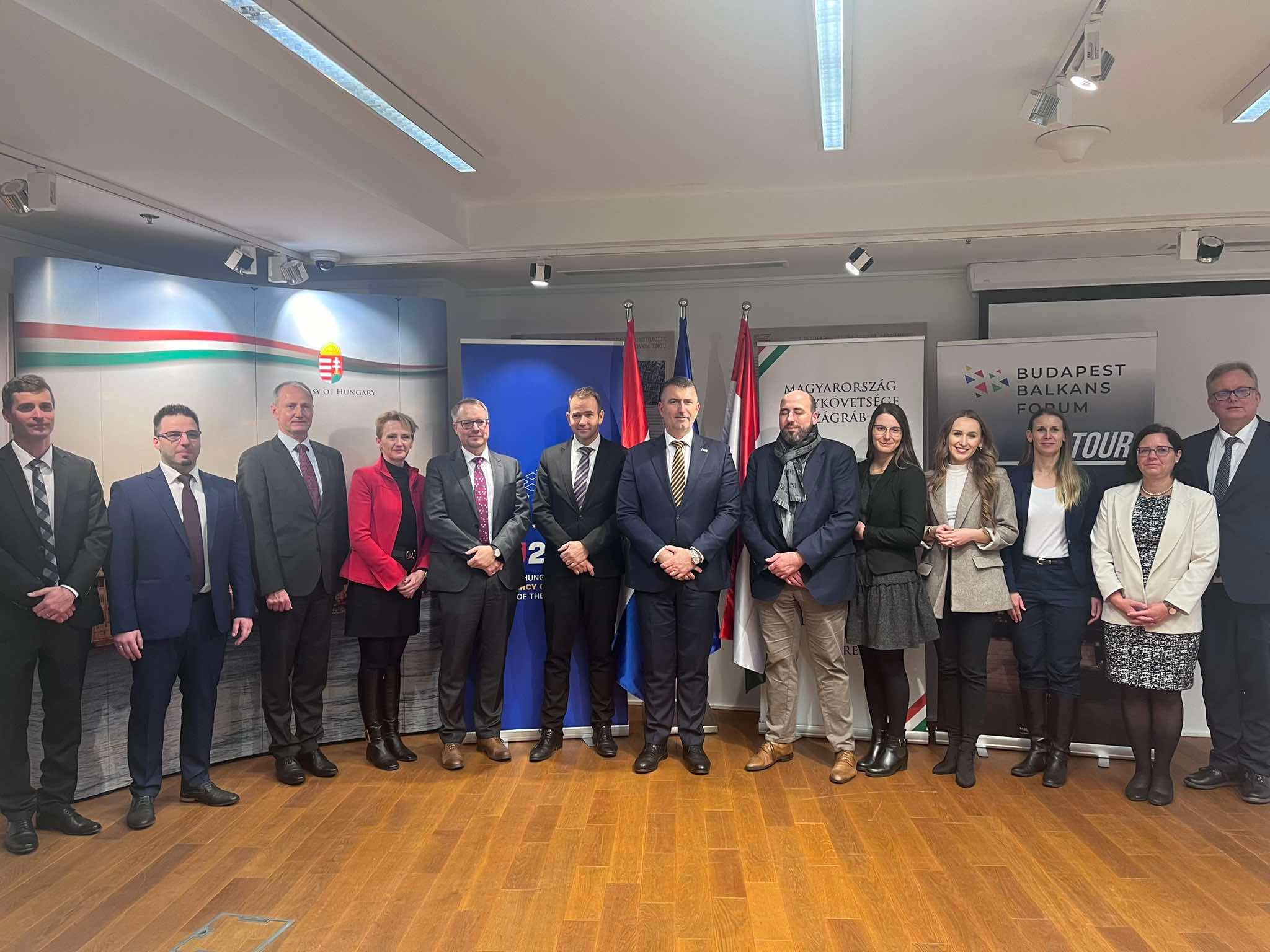On November 28, 2024, the Liszt Institute – Hungarian Cultural Centre in Zagreb hosted a conference as part of the BBF on Tour 2.0 program series as well as an official event of the ongoing Hungarian EU Presidency. Organized by the Hungarian Embassy in Zagreb and the Hungarian Institute of International Affairs (HIIA), the event entitled “Bridging Gaps, Bridging Europe: Hungary, Croatia, and the Strategic Enlargement of the Western Balkan” emphasized the critical role of European Union (EU) enlargement in promoting stability and prosperity in Europe.
In his welcoming remarks, H.E. Csaba Demcsák, Ambassador of Hungary, and Mr. Tamás Péter Baranyi, Director for Strategy of HIIA, emphasized the strong partnership between the Hungarian Embassy in Zagreb and HIIA in promoting the Budapest Balkans Forum. They highlighted the shared priorities of Hungary and Croatia in advocating for consistent and merit-based EU enlargement, underlining that the EU cannot be complete without the Western Balkans. A safe and secure region is essential for Europe’s stability and prosperity, and Hungary’s proactive Western Balkans agenda during its EU Presidency inspired the conference discussions.
In their keynote speeches, Mr. László Sinka, Adviser to the Minister at the Ministry of EU Affairs of Hungary, Mr. Zsolt Bunford, Special Envoy of the Prime Minister of Hungary for the Western Balkans and Mr. Stribor Kikerec, Director General for Southeast Europe of the Ministry of Foreign and European Affairs of the Republic of Croatia addressed the pressing challenges and opportunities facing the European Union, particularly in relation to the Western Balkans. They acknowledged the EU’s ongoing issues, such as re-established borders within the Schengen Area, unresolved migration policies, financial inefficiencies, and stalled integration efforts, all compounded by the war in Europe. They emphasized the need for strategic discussions to rebuild EU competitiveness, linking key priorities—including defence, migration, demography, and enlargement—to the Budapest Declaration. The speakers underscored the importance of restoring balance in enlargement efforts, ensuring the Western Balkans are integrated alongside Ukraine and Moldova. Highlighting Croatia as a testament to the transformative power of EU accession, they called for accelerating the integration process to secure stability, prevent geopolitical vacuums, and strengthen Europe’s position in the 21st century. Cultural diversity from the region was also recognized as an added value to the European identity, with the upcoming EU-Western Balkans Summit on December 18 in Brussels serving as a critical milestone.
The opening and keynote speeches were followed by two panel discussions, held under Chatham House rules, featuring Hungarian and Croatian government representatives and experts sharing their thoughts on the dilemmas, challenges and opportunities surrounding the EU’s enlargement towards the Western Balkans. The first one (“From Decline to Resilience: Tackling Geopolitical and Societal Challenges in the Western Balkans”) focused on the main challenges facing the region (ethnic divisions, rule of law, capacity issues, demographic and social challenges), while the second one (“Anchoring Stability: Hungary and Croatia’s Roles in Western Balkan EU Integration Amid Geopolitical Shifts”) brought together experts who are actively involved in supporting the Western Balkan countries’ accession to the EU.
Regarding the prospects of the region’s accession, the Hungarian side was most vocal in its desire to accelerate the process, while it was also stressed that it is important that the region should receive adequate attention and support alongside Ukraine. Representatives of the Croatian government placed greater emphasis on the candidate countries’ sincere commitment to reforms. They all agreed that ethnic divisions and an unresolved war past are still a potential mobilising tool in the hands of political parties, primarily for the purpose of staying in power, and that they can distract attention from the real problems affecting the people of the region. The latter is the reason for the significant emigration from the region, which, combined with a low birth rate has led to a demographic crisis. In addition to weaknesses in the rule of law, capacity constraints and mistrust between countries in the region are also a major limitation in addressing security challenges.
Both Croatia and Hungary are committed supporters of EU integration in the region, including through a wide range of assistance programmes and activities. Although the accession process and the EU itself are constantly evolving, the experience of the two countries remains relevant for the candidate countries in a number of ways that can facilitate their understanding of and adaptation to EU processes and language.
BBF on Tour 2.0 continues in Sofia on 9 December, where we will discuss the enlargement of the Schengen Area as one of the priorities of the Hungarian EU Presidency.




